Funny People
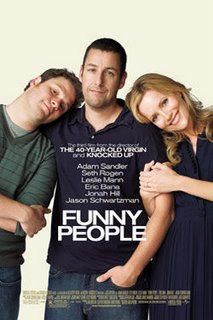 Judd Apatow's Funny People feels authentic. The movie is about the lives of stand up comics, and it feels real, because it is real. Before becoming a filmmaker, Apatow did his time on the stand up comedy circuit. So did his good friend and former roommate, Adam Sandler, who stars in the film. You can tell that this is a personal film for a lot of the comic actors involved, and that you are watching the closest roles to their real lives that they will probably ever get to play. Funny People is one of the summer's best and biggest surprises.
Judd Apatow's Funny People feels authentic. The movie is about the lives of stand up comics, and it feels real, because it is real. Before becoming a filmmaker, Apatow did his time on the stand up comedy circuit. So did his good friend and former roommate, Adam Sandler, who stars in the film. You can tell that this is a personal film for a lot of the comic actors involved, and that you are watching the closest roles to their real lives that they will probably ever get to play. Funny People is one of the summer's best and biggest surprises.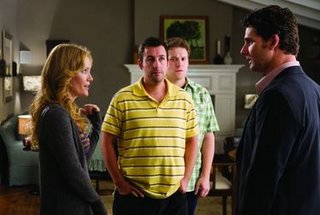 The film opens with actual home video footage that Apatow took of a young Sandler making comic prank calls to various businesses. The sequence is all at once hilarious and immature, which is a good way to describe the character that Sandler plays. He's George Simmons, the kind of guy all comics dream of being. He was able to move beyond stand up to TV, and ultimately feature films that may not exactly be viewed as classics, but have made him famous and wealthy beyond his wildest dreams. George's life is one of excess. He lives in a huge mansion by himself, he's got a different girl in his bed each night, and he has legions of fans and well-wishers. What he does not have is any sort of personal relationship. George has spent his entire life isolating himself from others, a lot of it having to do with personal pain. He's obviously been hurt more than he cares to admit. He's been living this way for years with no problem, but when he is diagnosed with a rare form of leukemia, he suddenly doesn't know what to do. He has no one to turn to.
The film opens with actual home video footage that Apatow took of a young Sandler making comic prank calls to various businesses. The sequence is all at once hilarious and immature, which is a good way to describe the character that Sandler plays. He's George Simmons, the kind of guy all comics dream of being. He was able to move beyond stand up to TV, and ultimately feature films that may not exactly be viewed as classics, but have made him famous and wealthy beyond his wildest dreams. George's life is one of excess. He lives in a huge mansion by himself, he's got a different girl in his bed each night, and he has legions of fans and well-wishers. What he does not have is any sort of personal relationship. George has spent his entire life isolating himself from others, a lot of it having to do with personal pain. He's obviously been hurt more than he cares to admit. He's been living this way for years with no problem, but when he is diagnosed with a rare form of leukemia, he suddenly doesn't know what to do. He has no one to turn to.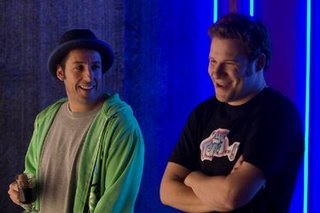 He starts re-evaluating his life up to this point. He starts thinking about and calling a woman from his past named Laura (Leslie Mann). Laura is the closest thing he ever had to a personal relationship, and he almost married her, but he cheated on her. Now she's married to an Australian man named Clarke (Eric Bana), who is equally unfaithful to her, but they have two kids (Apatow's own daughters, Maude and Iris), so she can't walk away. George also tries to go back to his roots and start doing stand up again, but his first night is a disaster. He's so preoccupied with his own mortality and feels so strange on the stage that he thought he left behind years ago, that he chokes. That same night, a wannabe comic named Ira Wright (Seth Rogen) takes the stage. He doesn't get a lot of laughs either, but George sees something in him. He asks Ira to be his personal at-home assistant, as well as his joke writer for future stand up appearances. Ira has idolized George since childhood, and sees it as a great opportunity, especially since he currently works at a local deli, and shares an apartment with two other comics (Jonah Hill and Jason Schwartzman), one of whom has a leading role on a NBC sitcom, and likes to leave his $20,000 paychecks on Ira's pillow to remind him how much better his career is going.
He starts re-evaluating his life up to this point. He starts thinking about and calling a woman from his past named Laura (Leslie Mann). Laura is the closest thing he ever had to a personal relationship, and he almost married her, but he cheated on her. Now she's married to an Australian man named Clarke (Eric Bana), who is equally unfaithful to her, but they have two kids (Apatow's own daughters, Maude and Iris), so she can't walk away. George also tries to go back to his roots and start doing stand up again, but his first night is a disaster. He's so preoccupied with his own mortality and feels so strange on the stage that he thought he left behind years ago, that he chokes. That same night, a wannabe comic named Ira Wright (Seth Rogen) takes the stage. He doesn't get a lot of laughs either, but George sees something in him. He asks Ira to be his personal at-home assistant, as well as his joke writer for future stand up appearances. Ira has idolized George since childhood, and sees it as a great opportunity, especially since he currently works at a local deli, and shares an apartment with two other comics (Jonah Hill and Jason Schwartzman), one of whom has a leading role on a NBC sitcom, and likes to leave his $20,000 paychecks on Ira's pillow to remind him how much better his career is going.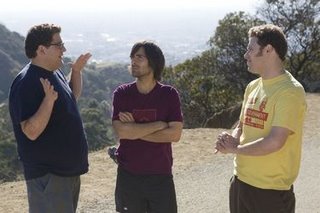 The relationship that grows between George and Ira is not exactly the one we expect. George does not become a better person through Ira, nor do they learn to open up to each other during the course of the film. They actually remain fairly guarded, though good friends. George's view of Ira seems to constantly change. Sometimes, he seems to be the only person he can trust. He's the first, and for a while the only, person he tells about his disease. Ira goes along on his doctor appointments, makes a mix of songs to help cheer him up, and writes a lot of his stand up material. He also takes the verbal abuse when George needs to lash out, and has no one to scream at. As for Ira, he seems to view George as a friend, though with more than a little idol worship. He wants to be there for the guy, because he understands his situation, but we also get a sense that just being with the guy alone is enough. Though George never actually takes on the role of a mentor, we can tell that Ira is using this as a learning experience of just what success can do.
The relationship that grows between George and Ira is not exactly the one we expect. George does not become a better person through Ira, nor do they learn to open up to each other during the course of the film. They actually remain fairly guarded, though good friends. George's view of Ira seems to constantly change. Sometimes, he seems to be the only person he can trust. He's the first, and for a while the only, person he tells about his disease. Ira goes along on his doctor appointments, makes a mix of songs to help cheer him up, and writes a lot of his stand up material. He also takes the verbal abuse when George needs to lash out, and has no one to scream at. As for Ira, he seems to view George as a friend, though with more than a little idol worship. He wants to be there for the guy, because he understands his situation, but we also get a sense that just being with the guy alone is enough. Though George never actually takes on the role of a mentor, we can tell that Ira is using this as a learning experience of just what success can do.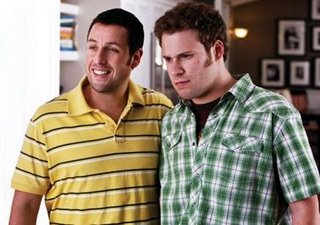 It is a credit to Apatow's screenplay and Sandler's performance that George does not become an entirely sympathetic character. He is manipulative, and is not above using his grim diagnosis to get what he wants from others. This includes his ex-fiance, Laura, whom he has a reconciliation with when he starts re-examining his life. They begin to rediscover their feelings for each other, but then, George starts making mistakes. He will not change his ways, and Laura realizes this. They are not the mistakes we expect, though. Funny People does not follow convention. It is not a medical drama, and it is not a story of redemption. Much like the movie itself, the conclusion it reaches is genuine. The characters are where they need to be, better or worse. As George, Sandler finds the perfect mix of self-obsession, self pity, and charm that allows us to understand why people are drawn to him in the first place. Much like his underrated turn in Punch Drunk Love, Sandler shows that he is an extremely capable actor able to tackle tough material. He's vulnerable, but guarded at the same time. Is he opening up to Ira or Laura out of trust, or is he doing it for personal gain? It's a surprisingly complicated performance, and easily his best turn on the screen so far.
It is a credit to Apatow's screenplay and Sandler's performance that George does not become an entirely sympathetic character. He is manipulative, and is not above using his grim diagnosis to get what he wants from others. This includes his ex-fiance, Laura, whom he has a reconciliation with when he starts re-examining his life. They begin to rediscover their feelings for each other, but then, George starts making mistakes. He will not change his ways, and Laura realizes this. They are not the mistakes we expect, though. Funny People does not follow convention. It is not a medical drama, and it is not a story of redemption. Much like the movie itself, the conclusion it reaches is genuine. The characters are where they need to be, better or worse. As George, Sandler finds the perfect mix of self-obsession, self pity, and charm that allows us to understand why people are drawn to him in the first place. Much like his underrated turn in Punch Drunk Love, Sandler shows that he is an extremely capable actor able to tackle tough material. He's vulnerable, but guarded at the same time. Is he opening up to Ira or Laura out of trust, or is he doing it for personal gain? It's a surprisingly complicated performance, and easily his best turn on the screen so far. As Ira, Seth Rogen continues to grow on me. He never impressed me in some of his past lead roles, such as in Knocked Up or Zack and Miri Make a Porno. He seemed wrong to be the lead (especially a romantic one), and seemed more comfortable as the goofy best friend character. He's starting to become a lot more natural to me. He impressed me with his darkly comic turn in Observe and Report earlier this year, and he impressed me even more here. He ditches his usual goofy slob persona, and gives what is probably his most honest screen performance yet. Unlike George, there is no manipulation with Ira. He's likeably open, and has obviously been dealt more than this share of life's slings and arrows. Unlike George, however, he has not gone into isolation. He embraces it, tries to better himself (much is made that he is trying to lose weight, which Rogen is doing in real life), and hopes to become a better person and comic for it. It's a great performance. He doesn't command the screen like Sandler does, but he does grab and hold our attention throughout.
As Ira, Seth Rogen continues to grow on me. He never impressed me in some of his past lead roles, such as in Knocked Up or Zack and Miri Make a Porno. He seemed wrong to be the lead (especially a romantic one), and seemed more comfortable as the goofy best friend character. He's starting to become a lot more natural to me. He impressed me with his darkly comic turn in Observe and Report earlier this year, and he impressed me even more here. He ditches his usual goofy slob persona, and gives what is probably his most honest screen performance yet. Unlike George, there is no manipulation with Ira. He's likeably open, and has obviously been dealt more than this share of life's slings and arrows. Unlike George, however, he has not gone into isolation. He embraces it, tries to better himself (much is made that he is trying to lose weight, which Rogen is doing in real life), and hopes to become a better person and comic for it. It's a great performance. He doesn't command the screen like Sandler does, but he does grab and hold our attention throughout. Many critics have accused Funny People of being too long, and that the entire last hour or so of the movie (dealing with George and Ira visiting Laura's home) could have been removed. For me, these scenes are what the movie is leading up to. This is when most of the surprises happen, and when we learn the most about the characters. It would be incomplete without it, in my eyes. Even at a length of two and a half hours, the movie never dragged for me. In fact, I'll venture to say that this is probably Apatow's best-paced movie yet. A lot of this has to do with the fact that he seems to be speaking directly from his heart in almost every scene. You can see the personal touches throughout, and I personally was fascinated. Besides, a great movie is never too long. I would gladly sit through two and a half hours of this then 90 minutes of Aliens in the Attic.
Many critics have accused Funny People of being too long, and that the entire last hour or so of the movie (dealing with George and Ira visiting Laura's home) could have been removed. For me, these scenes are what the movie is leading up to. This is when most of the surprises happen, and when we learn the most about the characters. It would be incomplete without it, in my eyes. Even at a length of two and a half hours, the movie never dragged for me. In fact, I'll venture to say that this is probably Apatow's best-paced movie yet. A lot of this has to do with the fact that he seems to be speaking directly from his heart in almost every scene. You can see the personal touches throughout, and I personally was fascinated. Besides, a great movie is never too long. I would gladly sit through two and a half hours of this then 90 minutes of Aliens in the Attic.
See the movie times in your area or buy the DVD at Amazon.com!






0 Comments:
Post a Comment
<< Home